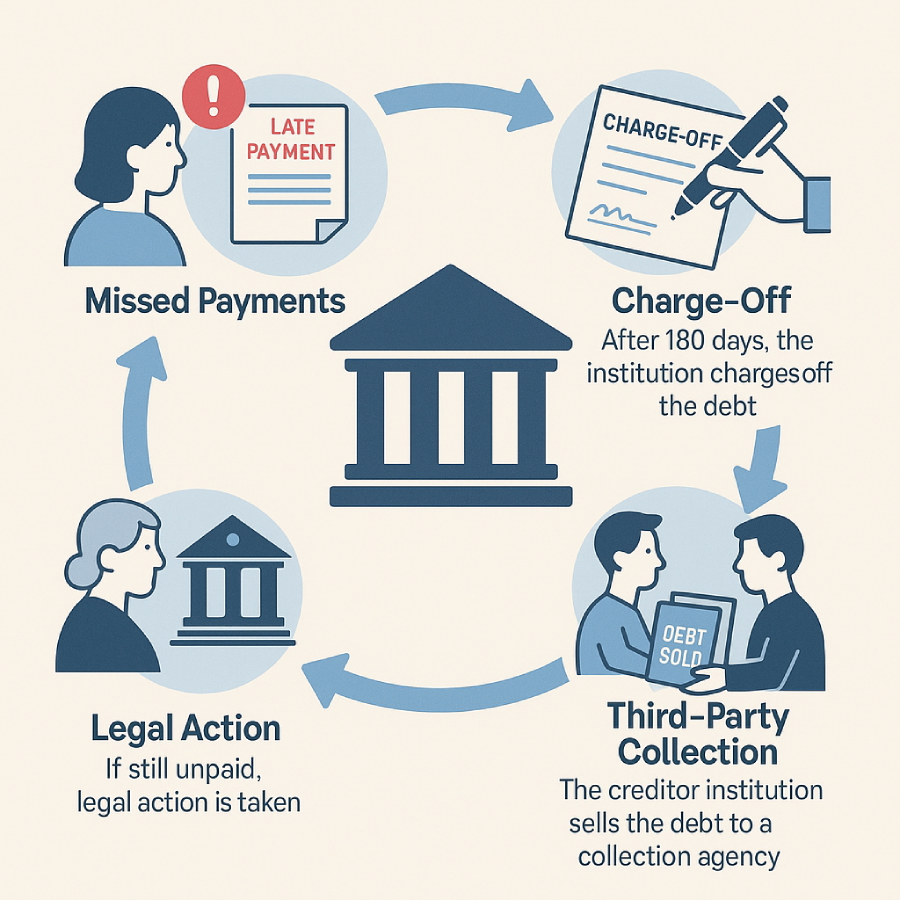Debt in the USA: A Comprehensive Guide

Secured Debt
Secured debt is backed by collateral-an asset the lender can take if you default.
Examples:
- Mortgages: Loans secured by real estate. If you miss payments, the lender can foreclose on your home. Foreclosure laws and timelines vary by state.
- Auto Loans: Loans secured by your vehicle. If you default, the lender can repossess your car. Repossession processes and consumer protections differ by state.
Key Points:
- Generally offer lower interest rates due to reduced risk for the lender.
- Failure to pay can result in loss of the asset.
State laws set rules for foreclosure and repossession, including notice requirements and redemption periods.


Unsecured Debt
- Credit Cards: Revolving credit lines with high interest rates. If unpaid, accounts may be sent to collections or sued for payment.
- Medical Bills: Often arise unexpectedly. Hospitals may offer payment plans; unpaid bills can be sent to collections.
- Personal Loans: Loans based on your creditworthiness, not collateral.
- Utility Bills: Unpaid bills can lead to service disconnection and collections.
- Higher interest rates due to increased risk for lenders.
- Creditors must sue in court to collect unpaid debts; they cannot seize property without a judgment.
- Debt collection practices are governed by federal law (FDCPA) and further regulated by many states.
- Some states require debt collectors to be licensed; unlicensed collectors may not sue in those states.
Student Loan Debt
- Federal Loans: Backed by the U.S. government. Offer income-driven repayment and deferment options. Rarely dischargeable in bankruptcy.
- Private Loans: Issued by banks or private lenders. Fewer protections than federal loans. State laws may impact collection practices.
- Defaulting can lead to wage garnishment and tax refund seizures (federal loans).
- Settlement or discharge is difficult, especially for federal loans.
- Some states offer additional protections for student borrowers.


Tax Debt
Types:
- Federal (IRS): Owed to the Internal Revenue Service. The IRS can garnish wages, levy bank accounts, or place liens on property without a court order.
- State/Local: Owed to state or local tax authorities. Collection powers and relief options vary by state.
Key Points:
- Tax authorities have significant collection powers.
- Payment plans and settlement programs (like IRS Offer in Compromise) are available.
- State tax relief programs and statutes of limitations differ by state.
Business Debt
Types:
- Secured Business Debt: Backed by business assets (equipment, inventory).
- Unsecured Business Debt: Not backed by collateral (vendor credit, lines of credit).
Key Points:
- Business owners may be personally liable if they signed a personal guarantee.
- Collection and bankruptcy rules may differ for business debts, especially for sole proprietors versus corporations.


Payday Loans
Short-term, high-interest loans are often due on your next payday.
Key Points:
- Extremely high fees and interest rates.
- Heavily regulated at the state level. Some states ban payday loans entirely, while others cap interest rates or restrict terms.
- Default can lead to aggressive collection practices; some states provide more consumer protection than others.
Legal Differences by State
- Debt Collection: Many states require debt collectors to be licensed. In some states, unlicensed collectors may not have the right to sue for payment.
- Bankruptcy Exemptions: Each state has its list of assets you can keep in bankruptcy. Some allow you to choose between state and federal exemptions, but you cannot mix them.
- Debt Settlement: States like Georgia and North Carolina require an attorney to handle settlements.
- Payday Loans: Laws range from outright bans to permissive regulation, depending on the state.
Consumer Protections
- Federal Law: The Fair Debt Collection Practices Act (FDCPA) protects consumers from abusive collection tactics and gives you the right to dispute debts and request verification13.
- State Law May offer additional protections, such as stricter licensing, limits on interest rates, or more robust bankruptcy exemptions.
Summary Table
Debt Type | Collateral? | Common Examples | Key Legal Points | State Differences? |
Secured Debt | Yes | Mortgages, Auto Loans | Foreclosure/repo laws, loss of asset | Yes |
Unsecured Debt | No | Credit cards, Medical | Collection lawsuits, FDCPA | Collector licensing varies |
Student Loans | No | Federal, Private | Hard to discharge, wage garnishment (federal) | Some borrower protections |
Tax Debt | No | IRS, State/Local | IRS/state collection powers, payment plans | Relief programs vary |
Business Debt | Varies | Business loans | Personal liability if guaranteed | Varies by business structure |
Payday Loans | No | Short-term loans | High cost, aggressive collection | Some states ban/restrict |
Understanding your debt type is crucial for choosing the right solution and knowing your rights. Laws and protections can vary significantly by state, so always check your state’s regulations or consult a qualified professional before deciding on debt relief or settlement.
Recommended Ressources
Explore expert-curated tools and guides to help you better understand and manage your debt. These resources are designed to support you on your journey to financial freedom.


